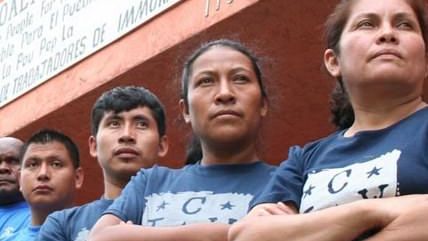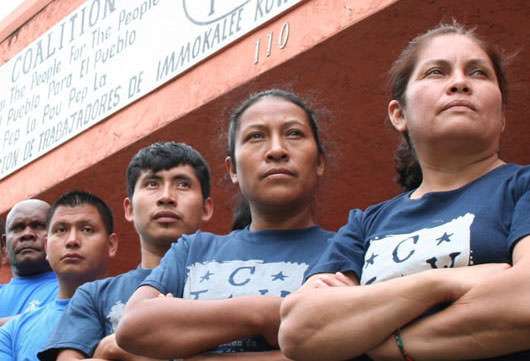Free-Market Labor Wins Wage-Boost Victory
Economic liberty shouldn't simply assume a pro-business stance, or discuss only the privileges government extends to unions.


Last week, the Coalition of Immokalee Workers announced an astonishing breakthrough in an ongoing campaign to win wage increases for 80,000-100,000 seasonal laborers picking tomatoes for Florida farms. Even more surprising, C.I.W. announced that the concessions came from Walmart, in a negotiated, government-free agreement with one of the more die-hard enemies of union contracts in corporate America.
Reported the Ft. Myers News-Press:
The retail giant has agreed to build the Fair Food Premium — the "penny-per-pound" — directly into the price it pays for Florida tomatoes and adhere to the program's standards on working conditions.
It joins the world's major fast-food companies, institutional food services and specialty grocers Whole Foods and Trader Joe's, who already participate in the program….
"We are truly pleased to welcome Walmart into the Fair Food Program. No other company has the market strength and consumer reach that Walmart has," said Gerardo Reyes of the CIW in a statement.
The Walmart agreement is the latest, the largest, and probably the most surprising win for C.I.W. in a decade-and-a-half campaign to increase wages and ease working conditions for Florida produce workers. For free marketeers the story is how the agreements were won: entirely without government certification, regulatory backing or legal protection. C.I.W.'s innovative use of protests, pressure campaigns and solidarity boycotts to win concessions from the world's biggest food corporations would be illegal had they stuck to bureaucratic templates for mainline, National Labor Relations Board-certified unions.
C.I.W. is a community-based worker organization, made up of tomato pickers in Immokalee, a migrant farmworker community in southwest Florida. Extremely poor, nearly all immigrants, many undocumented, and speaking four different languages, C.I.W.'s workers are exactly the sort of precarious manual laborers that AFL-line unions have written off as too transient or too divided to organize. Conventional unions have little incentive to try; from the Wagner Act on, U.S. labor law excludes farmworkers, domestic laborers, and independent contractors from legal bargaining-unit certification.
But despite that—or because of it—C.I.W.'s un-conventional labor activism has scored a series of major wins on wages and conditions since 2001. Founded in 1993, C.I.W. organized local strikes and protests in Immokalee, helping workers recover stolen wages and demanding increased piece rates. After some successes and a lot of stonewalling, they outlined a daring new strategy. Huge agribusiness employers don't care about public protest: they don't sell tomatoes to the public. But growers sold tomatoes to name-brand restaurants and grocery stores. Those businesses are highly sensitive to public opinion. So C.I.W. decided to convince corporate buyers to intervene with their suppliers.
In 2001, C.I.W. introduced a contractual pass-through program for companies to voluntarily and directly pay the cost of wage increases. They chose Taco Bell for their first target, and launched a bold, eye-catching campaign using sympathy protests, hunger strikes, pickets, and street theater, amplified by online activist networks and social media. Finally they worked with student groups in a hardball campaign to boot Taco Bell franchises from lucrative dining-service contracts on college campuses. Taco Bell finally conceded after four years of boycotts and 25 schools canceling contracts. C.I.W. then quickly mounted and won new campaigns targeting McDonald's, Burger King, Whole Foods, Subway, and seven other restaurants, supermarkets, and dining-service companies.
The Fair Food Program has paid off with $11,000,000 in increased income for Florida tomato-pickers, after three decades of stagnant wages, and new policies to curb assault, sexual abuse and unsafe conditions in the fields. Walmart's agreement is remarkable as the first FFP agreement won without picketing, boycotting or pressure campaigns on the corporation – although C.I.W.'s highly visible ongoing pickets against Publix provided a PR incentive for grocery-store competitors to get out in front.
C.I.W.'s big wins make them one of the most successful examples of the emerging trend of "alt-labor" organizations. Groups like C.I.W., the Restaurant Opportunities Center, OUR Walmart, and the Domestic Workers United dispense with formal unionization, sidestepping both the privileges and constraints of NLRB labor law, and employ deliberately non-state mechanisms – workplace activism, outreach to consumers, shaming protests, and pressure campaigns—to mobilize workers, provide social support and pressure companies for better pay and conditions. Alt-labor approaches have proven especially successful for workers excluded from NLRB recognition, or in sectors (like low-wage service or restaurant work) where AFL-style collective bargaining has proven difficult or impossible.
Inspiring success stories grab attention in an otherwise dismal scene for organized labor. So should how they happened: through wildcat tactics that only alt-labor organizations like C.I.W. could pull off. They could mobilize consumer pressure and gain Fair Food premiums from corporate buyers only because they followed the supply chain instead of dealing with stonewalling direct employers. Protests and solidarity boycotts directed at corporate buyers compelled companies like Taco Bell, McDonald's, and Walmart to weigh in. Conventional NLRB union regulations would render their entire strategy illegal, as a "secondary action" prohibited under the Taft-Hartley Act.
All this offers the ironic spectacle of progressive commentators offering grudging admiration for labor activists "avoiding government and putting pressure on the corporations at the top of the nation's food chain," while conservative pro-business lobbies bemoan "loopholes" in New Deal labor regulations and urge Congress to intervene to smooth out labor disputes. For libertarians, it remind us that arguments for economic liberty shouldn't simply assume a pro-business stance, or discuss only the privileges government extends to unions.
We often neglect to notice how government privileges to one sort of union come with nets of regulatory strings. The original design and political purpose of the NLRB system was for "industrial peace" with the conservative, bureaucratic, and manageable "business unionism" of the AFL-CIO, at the expense of another, wilder strain based on creative protest and grassroots social activism. Alt-labor successes should remind us that freed-market processes don't just mean free rein for employers to do whatever they please; they also include unregulated, worker-driven competitive pressures, voluntary labor associations, social entrepreneurship, and freewheeling social activism, as part of hard-driving competitive bargaining. Alt-labor exemplifies the ability of market processes to weed out abusive practices and enable even the poorest workers to cooperate and bargain from a position of strength.
Alt-labor is commonly described in the context of "non-traditional labor groups," but it really belongs to a long tradition of alternative, counter-political labor movements. This tradition includes the UFW's secondary boycotts in the grape campaigns, or the anarchist-inspired I.W.W.'s minority unionism, sympathy strikes and boycotts, and enlisting public pressure through "open mouth sabotage." Employing libertarian methods of voluntary association, nonviolent activism, and social solidarity to back up hard bargaining, alt-labor hearkens back to an older strand of pre-New-Deal labor radicalism: a less legalistic, more anti-political, freer, and (therefore) more vigorous, less domesticated labor movement.
Free-marketeers should welcome the shift towards voluntary association and grassroots protest; as CIW organizer Gerardo Reyes Chávez says, the success of the Fair Food Program "shows the power of the market, and how it can improve the wages, improve the lives of workers."
Since last week's announcement, CIW continues to press on in its campaign to win a Fair Food agreement from the Publix supermarket chain. Meanwhile, Walmart may not be able to rest on its PR laurels for long, as the company now faces high-profile alt-labor efforts to organize associates on Walmart shopfloors.


Show Comments (26)